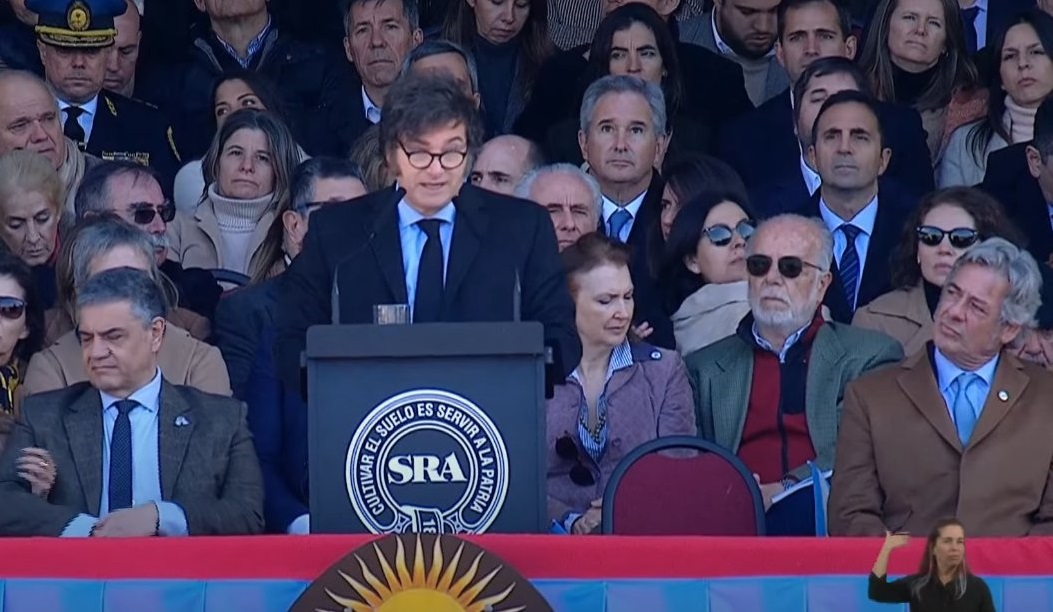
The 136th Rural Society Exhibition was formally inaugurated this Sunday after speeches by Nicolás Pino, president of the entity, and Javier Milei.
“It is an honor and a privilege that a president of the nation has returned to the Palermo grounds for the Rural Exhibition,” began Pino, in a speech that was marked by the sector’s political support and harmony towards the measures he has been taking since his inauguration in December. Throughout his speech he made sure to confirm this, but he also took the opportunity to publicly claim a series of measures for which the large agricultural employers have been strongly pressing, such as elimination of the exchange rate restriction (devaluation) and the removal of export taxes.
“We could focus on the complaint and the claim: there would be sufficient reasons. Instead, we prefer at this time to appeal to the patience of the man and woman of the countryside, because We believe it is useful to give the government a space of trustas given by the citizens in the 2023 elections. Indeed, the current authorities have made a series of positive moves towards fundamental State policies” he noted. But immediately, he took the opportunity to raise what his current demands are: “We are attentive to see if these positive movements continue and continue to materialize in other government measures.”
The lead-up to the speech had been marked by different versions. Perhaps as pure speculation or perhaps as spokesmen for the big agricultural employers, some media insisted on “the need” to eliminate the withholdings and even hinted that there might be some announcement in that sense. In the end, that was not what happened, but Pino made it clear that this is one of the main demands of the entire countryside, which was answered with great applause from the posh stands of the premises.
“You know very well what the fundamental problem is that we are talking about. Producers continue to be burdened by export duties. If they were eliminated, there would be immediate responses of increased production and employment. Withholdings cause discouragement and the disappearance of agricultural producers. We need assurance that you will remove the withholdings. “If we continue to work like this, it is because we trust in your word,” the business leader stressed in what was a public demand. He also insisted on the need to “end the different exchange rates and eliminate the exchange rate cap.”
“Mr. President, you know very well what the fundamental problem is that we are talking about. Producers continue to be burdened by export duties – known as withholdings – which treat the countryside unequally, compared to other sectors…
— Rural Society (@SociedadRural) July 28, 2024
In turn, Milei made an effort to make it clear that the government is totally aligned with the interests of the large agricultural chambers and did not spare words of praise. “You are all the great protagonists of Argentine economic life, who pull the country forward despite the fact that the hill is increasingly steep and without a doubt deserve to be called heroes” he said. He added: “Politics punished them with taxes to finance their dirigiste adventures and this “was accompanied by defamation of the agricultural sector, saying bad things, calling them oligarchs and sepoys.” The audience was enthusiastic, but Little by little they were losing their enthusiasm.
After puffing out his chest for the adjustment made so far – “the largest in the history of humanity,” he said proudly – and stressing that “we are taking the boot off them to stop suffocating them and so that they can once again be the private sector that produces wealth,” asked for time to carry out the elimination of withholdings and the exchange rate restrictions and avoided giving a date for that. “There is no point in making changes that cannot be sustained over time. Achieving sustainability takes time.“To say otherwise is to lie to you, and I did not come to lie to you. Nobody wants to get out of this disastrous model as much as we do. Between withholdings and restrictions, the countryside is expropriating 70% of what it produces. We are going to put an end to that once and for all,” he promised, almost imploring them to believe him, while timid applause of commitment could be heard.
Despite the words of praise, Milei also made her stance clear and He thus exposed the tension that exists between the government and the sector of the entities who is pushing for devaluation and the elimination of withholdings to liquidate the harvest: “We don’t care how much pressure there is and where it comes from, we are not going to rush in demagogically.”
After that, he went on to list some minor measures for the countryside that left a bitter taste in the mouth of landowners and stated that the Government’s intention is to reduce the PAIS tax to 7.5% in September and eliminate it altogether in December. Something that remains to be seen if it is possible, since it would further affect the State’s tax plans and revenue collection.
“We are fulfilling the most important objective of all, which is to end inflation and clean up the Central Bank’s balance sheet in order to end the currency controls and unpredictability,” he repeated at the end, in his attempt to convince them to stop withholding the harvest and agree to liquidate. “For the first time in 100 years we have a government that wants exactly the same country that you wantLet’s go together hand in hand, Let’s take advantage of the opportunitylet’s take the bull by the horns and bet on Argentina” he concluded. Almost an open hearted request so that, despite the absence of new measures, producers will support them and allow the government to obtain part of the dollars that needs to raise funds to address the serious problem of reserve accumulation that it is facing.
Despite the political support of the SRA and most of the organizations of the Liaison Committee, it became clear again that Tensions over withholdings and the exchange rate are far from easing. The economic plan requires a faster pace of crop sales than the current one and the government knows this, but it does not seem willing (at least for now) to modify the current conditions. On the other hand, the data provided by the Chamber of the Oil Industry and the Center of Cereal Exporters (CIARA-CEC) is conclusive: there are still 34.954 million tons of soybeans that are stored and have not been sold, which means that 73% of annual production has not yet been marketed. A number much higher than in previous years, despite the political harmony with the ruling party. In this context, Milei went up to the podium and spoke to them from the heart, but the rural employers only listen with their pockets.
Source: www.laizquierdadiario.com

